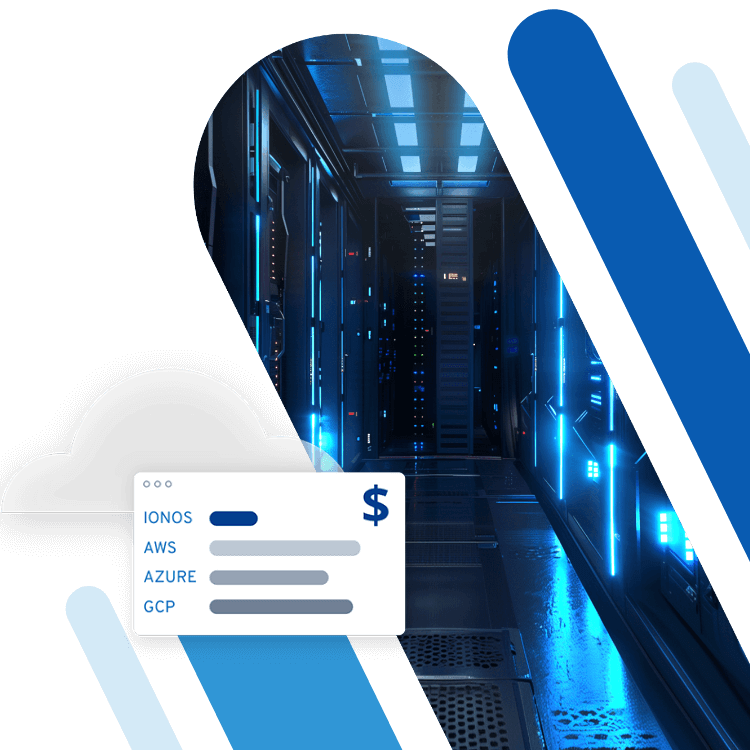What are data centers?
Many companies offer their services online. From online shops to web apps to websites - a business that wants to be present and gain new customers must have a suitable web presence. Round-the-clock availability of websites and services is imperative. To ensure this, hosting providers and large corporations rely on the power of data centers. But what is a data center and how does it work?
- Cost-effective vCPUs and powerful dedicated cores
- Flexibility with no minimum contract
- 24/7 expert support included

Data center: definition
Put simply, a data center is a physical location - usually a standalone building - that stores critical data and applications on a large scale. It consists of a network of computing and storage resources such as routers and servers that enable the provision of data and applications. In this way, companies or Internet service providers can manage their entire IT infrastructure and data processing efficiently and securely.
By now, the infrastructure of data centers has evolved significantly. The computing power of traditional physical servers on-site has been connected to the flexible possibilities of virtual networks: much data is now connected across several data centers and public and private clouds. Therefore, a modern data center must be able to communicate across different locations.
Why is a data center important for a company?
Most business applications and activities within a company generate data that must be securely stored. This includes, for example:
- Emails and data clearance
- Productivity applications
- Websites
- Online transactions
- Data in CRM tools
- Company resource planning
- Data banks
- Big Data and artificial intelligence
- Virtual Desktops
- Communication and collaboration services
Large companies accumulate huge amounts of data that require many servers and plenty of storage space. Often, a simple server room is no longer sufficient to cope with the flow of data. In addition, maintenance can be complicated. High energy costs and in some cases even monitoring around the clock to prevent server failures and ward off cyberattacks push some companies to their limits.
That’s where data centers can be useful: the data is stored in a secure location that is monitored around the clock. In addition, a data center installs temperature control mechanisms to avoid its servers from overheating. At the same time, the emergency power supply ensures that the data is stored in a fail-safe manner and the risk of server failures is reduced. Depending on the type of data center, companies usually only pay for the space and the electricity they use. In return, they save time in administration and infrastructure, and can focus on their core business.
Duties of a data center
The tasks of a data center differ depending on the location, owner, and area of application. Even with managed service or colocation data centers, customers use different computing services and tasks. A data center can take on various tasks, from simple processes such as storage for data backup to the storage and execution of basic IT processes.
Some data centers act as a connection point that bring together different colocation environments. This is important, for example, for streaming films, which typically involves a CDN (Content Delivery Network) from a colocation environment connecting with an Internet Service Provider (ISP).
Hyperscale and wholesale data centers, on the other hand, are optimized for the requirements of individual companies and are particularly suitable for larger companies.
What are the basic components of a data center?
For a data center to work optimally, it is usually structured into various areas that work together efficiently.
IT equipment for the operation of the network and data storage
One of the most important features of a data center is its IT equipment. This encompasses all the components that are required for the operation of the network and data storage. There are four areas:
- Server hardware: From high-performance CPUs to fast main memories to large hard drives, the server hardware includes all the technical components that are built into the individual computers.
- Active network components: Devices such as routers, switches, firewalls (hardware), and other controllers that are required for the operation of the active network and that require an active power connection are active network components.
- Passive network components: The data center requires passive network components for the operation of the network. In comparison to active network components, passive ones such as cables, plugs, and sockets do not require their own power connection.
- Sub-racks: The server hardware and network components are fastened in a metal housing - the so-called sub-racks or racks. An internationally standardized size with a 19-inch design ensures that the racks are compatible with all assemblies.
Personnel for the smooth operation of data centers
Though most data centers are now highly automated, human staff is essential. The servers, the network, and the entire infrastructure must be monitored around the clock. It is the only way to prevent failures or correct them promptly if problems occur. The tasks of the data center staff are divided into the areas of system technology and administration:
- The system technology staff oversee all electronic tasks in a data center. This includes the installation of devices, the exchange or repair of defective hardware as well as the connection of individual components.
- The system administrators manage the server-side configuration of the systems and monitor their operation. In addition, they are responsible for data security and data protection in the data center.
Infrastructure components
The final building block that ensures smooth operation of the data center are the individual infrastructure components. Depending on the structure and equipment of the building, these vary widely.
- Environmental control: An ideal temperature in a data center is the be-all and end-all. The large number of servers generate a lot of heat, which if not controlled, could lead to overheating and failure of the servers. Sophisticated systems and architectural measures ensure an efficient cooling circuit and optimal temperatures within the data center.
- Energy supply: All data centers use electricity. That is why it is more important to ensure a constant, fail-safe power supply. This is achieved, for one, via redundant power connections that are supplied with energy from two different suppliers. On the other hand, a battery bridges short power failure, while a dedicated diesel generator is in place in the event of longer-lasting power failures.
- Security technology: To protect sensitive data from third parties, access to the data center should only be allowed to authorized persons who have to identify themselves using a keycard or fingerprint scanner. In addition, modern video surveillance is required, which provides a view of the entire center. Modern fire protection systems should be used to protect personnel and equipment in the event of a fire.
To counteract the high-power consumption of a data center, many operators of “green data centers” rely on modern hardware with smart technology, sustainable electricity, and green IT certification.
Data center: types, maintenance, and administration
There are many types of data centers that are managed differently depending on their purpose and owner. The type depends on various factors. Is the data center being used by one or more companies, for example? What technology does it use to process and store data? What is its energy efficiency like? In general, there are four main types of data centers:
- Enterprise data centers: These data centers are built by a company and optimized for its end users. The data center is owned by a company and is usually located on its premises. Therefore, the company is also responsible for maintaining and managing the infrastructure and its IT components.
- Managed service data centers: These data centers are managed and serviced by a third party on behalf of a company. The company rents all the equipment and infrastructure so that there is no additional expense.
- Colocation data centers: Compared to a managed service data center, here the company rents a room within a data center that’s equipped with the existing infrastructure such as cooling, bandwidth, and security measures. Components such as servers, storage, and firewalls are provided, managed, and maintained by the company itself.
- Cloud data centers: This off-premises variant of a data center has public cloud providers such as Amazon Web Services (AWS), Microsoft (Azure) or IBM Cloud that host the data and applications. Maintenance and administration of data are the responsibility of the respective provider.
Thanks to free starting credit, you can test the IONOS cloud server for 1 month free of charge (or until the credit is used up) and experience the perfect combination of performance and security!

Data center or server room: what is the difference?
While a data center usually describes an entire building with servers, storage, and all the necessary components, server rooms consist of a single room in a larger building. Server rooms are a good alternative to a complex data center, especially for small and medium-sized companies where data volumes and applications are manageable. Many of them now come similarly equipped to a data center. Here, the security and supply are the responsibility of the center owner or client.
IONOS has data centers in five European countries and North America that meet the highest requirements in terms of security, performance, and availability. The following video gives an overview of IONOS data centers:
 To display this video, third-party cookies are required. You can access and change your cookie settings here.
To display this video, third-party cookies are required. You can access and change your cookie settings here. 
